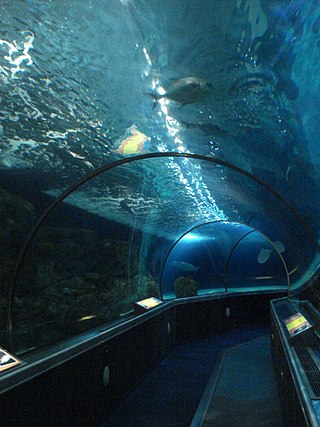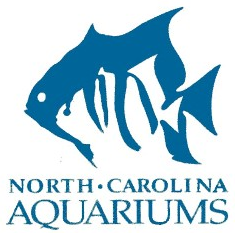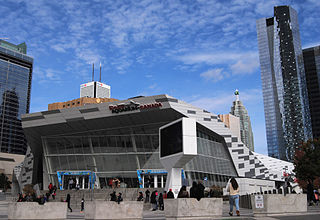
The National Aquarium – also known as National Aquarium in Baltimore and formerly known as Baltimore Aquarium – is a non-profit public aquarium located at 501 East Pratt Street on Pier 3 in the Inner Harbor area of downtown Baltimore, Maryland in the United States. Constructed during a period of urban renewal in Baltimore, the aquarium opened on August 8, 1981. The aquarium has an annual attendance of 1.5 million visitors and is the largest tourism attraction in the State of Maryland. The aquarium holds more than 2,200,000 US gallons (8,300,000 L) of water, and has more than 17,000 specimens representing over 750 species. The National Aquarium's mission is to inspire conservation of the world's aquatic treasures. The aquarium's stated vision is to confront pressing issues facing global aquatic habitats through pioneering science, conservation, and educational programming.

The cownose ray is a species of Batoidea found throughout a large part of the western Atlantic and Caribbean, from New England to southern Brazil. These rays also belong to the order Myliobatiformes, a group that is shared by bat rays, manta rays, and eagle rays.

Shedd Aquarium is an indoor public aquarium in Chicago. Opened on May 30, 1930, the 5 million US gal aquarium holds about 32,000 animals and is the third largest aquarium in the Western Hemisphere, after the Georgia Aquarium and Monterey Bay Aquarium.

The New England Aquarium is a nonprofit organization located in Boston, Massachusetts. The species exhibited include harbor and northern fur seals, California sea lions, African and southern rockhopper penguins, giant Pacific octopuses, weedy seadragons, and thousands of saltwater and freshwater fishes. In addition to the main aquarium building, attractions at Central Wharf include the Simons Theatre and the New England Aquarium Whale Watch. More than 1.3 million guests visited the aquarium each year prior to the outbreak of the COVID-19 pandemic.

Sea Life at Mall of America is a public aquarium located in the Mall of America in Bloomington, Minnesota, United States. The 1.3 million-US-gallon aquarium contains thousands of aquatic creatures, including sea turtles, sharks, sawfish, stingrays, jellyfish and seahorses. There are eleven exhibits featured at the aquarium. The aquarium is highlighted by a 300-foot (91 m) 360° clear acrylic tunnel, which consists of four different areas housing both freshwater and salt water creatures.

Audubon Aquarium is an aquarium in New Orleans, Louisiana, United States. After a $41 million dollar renovation that would see the Audubon Insectarium merge with the facility, the aquarium reopened with new exhibits and experiences on June 8, 2023. The Audubon Nature Institute runs the aquarium, and the institute also supervises the Audubon Zoo, Audubon Louisiana Nature Center, Freeport-McMoRan Audubon Species Survival Center, Audubon Center for Research of Endangered Species (ACRES), Coastal Wildlife Network, Audubon Wilderness Park, and Audubon Park. The aquarium is located along the banks of the Mississippi River by the edge of the historic French Quarter off Canal Street, at the upper end of Woldenberg Park and originally opened on September 1, 1990.

Underwater World, also known as Underwater World Singapore Pte Ltd, was an oceanarium located on the offshore Singaporean island of Sentosa. It was opened on 13 May 1991 and closed on 26 June 2016.

Kelly Tarlton's Sea Life Aquarium is a public aquarium opened in 1985 in Auckland, New Zealand. Located at 23 Tamaki Drive, it was the brainchild of New Zealand marine archaeologist and diver Kelly Tarlton (1937–1985).
The Fort Worth Zoo is a zoo in Fort Worth, Texas, United States, and is home to 7,000 native and exotic animals. It has been named as a top zoo in the nation by Family Life magazine, the Los Angeles Times and USA Today, as well as one of the top zoos in the South by Southern Living Reader's Choice Awards.

The ABQ BioPark Aquarium, located in Albuquerque, New Mexico, United States is a facility of the Albuquerque Biological Park and is located next door to the ABQ BioPark Botanic Garden. The ABQ BioPark Aquarium exhibits Gulf of Mexico and South Pacific saltwater species from a variety of habitats, including surf zone, shallow waters, coral reefs, open ocean and deep ocean. The highlight of the aquarium is a 285,000 U.S. gal (1,080,000 L) shark tank with a 38-foot (12 m)-wide, 9-foot (2.7 m)-high, 8-inch (200 mm)-thick acrylic viewing window.

The Aquarium of Western Australia (AQWA) is a privately owned aquarium in Hillarys, Western Australia. Located approximately 20 km (12 mi) north-west of Perth City, it is a popular attraction for tourists and locals alike.

Shark Reef Aquarium is a public aquarium on the Las Vegas Strip in Paradise, Nevada. It is located at and owned by the Mandalay Bay resort. The attraction opened on June 20, 2000. Its main tank is 1,300,000 US gallons (4,900,000 L), one of the largest in North America. The facility is 105,000 sq ft (9,800 m2), and displays numerous species of sharks, rays, fish, reptiles, and marine invertebrates. It also features a shark tunnel. The reef was developed in consultation with the Vancouver Aquarium.

The Virginia Aquarium & Marine Science Center, formerly known as the Virginia Marine Science Museum, is an aquarium and marine science museum located in Virginia Beach, Virginia, just south of Rudee Inlet. The exhibits at the museum are contained in over 800,000 US gallons (3,028,000 L) of fresh and saltwater displays.

North Carolina Aquariums is a system of three public aquariums located in Kure Beach, Roanoke Island and Pine Knoll Shores. All are operated by the Aquariums Division of the North Carolina Department of Natural and Cultural Resources since 1976 and were accredited by the Association of Zoos and Aquariums. All three aquariums feature dive shows, live animal encounters, and feeding programs.

Downtown Aquarium is a public aquarium and restaurant located in Houston, Texas, United States, that was developed from two Houston landmarks: Fire Station No. 1 and the Central Waterworks Building. The aquarium is located on a 6-acre (2.4 ha) site at 410 Bagby Street in downtown Houston. It houses over 200 species of aquatic animals in 500,000 US gallons (1,900,000 L) of aquariums. The complex includes two restaurants, a bar, and banquet facilities. It offers programs such as Marine Biologist for a Day, Zoologist for a Day, Sea Safari Camp, overnight stays and more. The education department works with school groups and conducts outreach programs.

Palma Aquarium is a commercial aquarium and park that first opened in 2007 in Palma, Mallorca, Spain. The aquarium is the property of Coral World International. The aquarium is 500 m (1,600 ft) from Playa de Palma beach, and includes 55 tanks which are home to over 700 different species from the Mediterranean Sea and the Indian, Atlantic and Pacific Oceans. One tank, "Big Blue" is 8.5 m (28 ft) deep, the deepest shark tank in Europe, and it also contains the largest collection of live coral in Europe The park was awarded "Best Business Initiative in the Balearics 2007", awarded by Actualidad Económica magazine, and was awarded the "2007 Accessibility Prize" by the Consell de Mallorca.

Ripley's Aquarium of Canada is a public aquarium in Toronto, Ontario, Canada. The aquarium is one of three aquariums owned-and-operated by Ripley Entertainment. It is located in downtown Toronto, just southeast of the CN Tower. The aquarium has 5.7 million litres of marine and freshwater habitats from across the world. The exhibits hold more than 20,000 exotic sea and freshwater specimens from more than 450 species.

Eilat's Coral World Underwater Observatory is a public aquarium, park and conservation center located in Eilat, Israel. It is the biggest public aquarium in Israel, and it hosts over 800 species. It was founded in 1974 and was the first of its kind. The park and aquarium is located to the south of Eilat's Coral Beach nature reserve.
The Shreveport Aquarium is an aquarium located in Bossier City, Louisiana, United States.

The Acuario de Veracruz is a public aquarium located in the city of Veracruz. It is the biggest aquarium in Mexico and Latin America by water volume, with 7 million liters of water.

























